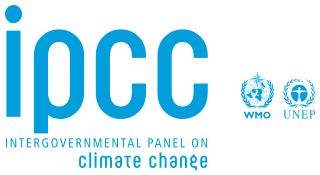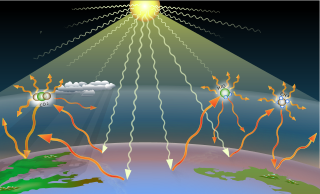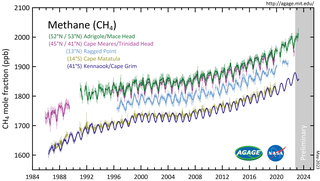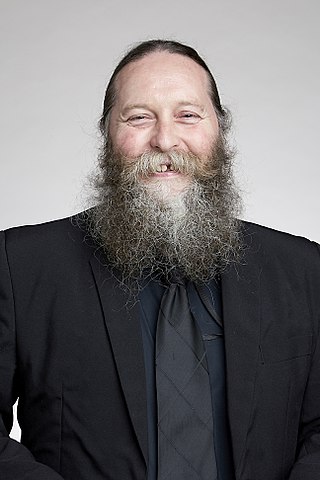Related Research Articles

Efforts to scientifically ascertain and attribute mechanisms responsible for recent global warming and related climate changes on Earth have found that the main driver is elevated levels of greenhouse gases produced by human activities, with natural forces adding variability. The likely range of human-induced surface-level air warming by 2010–2019 compared to levels in 1850–1900 is 0.8 °C to 1.3 °C, with a best estimate of 1.07 °C. This is close to the observed overall warming during that time of 0.9 °C to 1.2 °C, while temperature changes during that time were likely only ±0.1 °C due to natural forcings and ±0.2 °C due to variability in the climate.

The Intergovernmental Panel on Climate Change (IPCC) is an intergovernmental body of the United Nations. Its job is to advance scientific knowledge about climate change caused by human activities. The World Meteorological Organization (WMO) and the United Nations Environment Programme (UNEP) established the IPCC in 1988. The United Nations endorsed the creation of the IPCC later that year. It has a secretariat in Geneva, Switzerland, hosted by the WMO. It has 195 member states who govern the IPCC. The member states elect a bureau of scientists to serve through an assessment cycle. A cycle is usually six to seven years. The bureau selects experts to prepare IPCC reports. It draws the experts from nominations by governments and observer organizations. The IPCC has three working groups and a task force, which carry out its scientific work.

There is a strong scientific consensus that the Earth is warming and that this warming is mainly caused by human activities. This consensus is supported by various studies of scientists' opinions and by position statements of scientific organizations, many of which explicitly agree with the Intergovernmental Panel on Climate Change (IPCC) synthesis reports.

Philip Douglas Jones is a former director of the Climatic Research Unit (CRU) and a professor in the School of Environmental Sciences at the University of East Anglia (UEA) from 1998, having begun his career at the unit in 1976. He retired from these positions at the end of 2016, and was replaced as CRU director by Tim Osborn. Jones then took up a position as a Professorial Fellow at the UEA from January 2017.
Richard "Rich" Gayle Richels directs global climate change research at the Electric Power Research Institute. Richels received a BS degree in physics from the College of William & Mary. He was awarded MS and PhD degrees in decision science from Harvard University's Division of Applied Sciences.

Greenhouse gases are the gases in the atmosphere that raise the surface temperature of planets such as the Earth. What distinguishes them from other gases is that they absorb the wavelengths of radiation that a planet emits, resulting in the greenhouse effect. The Earth is warmed by sunlight, causing its surface to radiate heat, which is then mostly absorbed by water vapor (H2O), carbon dioxide (CO2), methane (CH4), nitrous oxide (N2O), and ozone (O3). Without greenhouse gases, the average temperature of Earth's surface would be about −18 °C (0 °F), rather than the present average of 15 °C (59 °F).
Tom Michael Lampe Wigley is a climate scientist at the University of Adelaide. He is also affiliated with the University Corporation for Atmospheric Research. He was named a fellow of the American Association for the Advancement of Science (AAAS) for his major contributions to climate and carbon cycle modeling and to climate data analysis, and because he is "one of the world's foremost experts on climate change and one of the most highly cited scientists in the discipline." His Web of Science h-index is 75, and his Google Scholar h-index is 114. He has contributed to many of the reports published by the Intergovernmental Panel on Climate Change (IPCC), a body that was recognized in 2007 by the joint award of the 2007 Nobel Peace Prize. In 2018 he was named as one of the world's top ten climate change scientists by thebestschools.org.

Atmospheric methane is the methane present in Earth's atmosphere. The concentration of atmospheric methane is increasing due to methane emissions, and is causing climate change. Methane is one of the most potent greenhouse gases. Methane's radiative forcing (RF) of climate is direct, and it is the second largest contributor to human-caused climate forcing in the historical period. Methane is a major source of water vapour in the stratosphere through oxidation; and water vapour adds about 15% to methane's radiative forcing effect. The global warming potential (GWP) for methane is about 84 in terms of its impact over a 20-year timeframe. That means it traps 84 times more heat per mass unit than carbon dioxide (CO2) and 105 times the effect when accounting for aerosol interactions.
David S. Reay is a climate change scientist, author, and professor of carbon management and education at the University of Edinburgh. He serves as co-chair of the Just Transition Commission, executive director of the Edinburgh Climate Change Institute and policy director of ClimateXChange.
The Climatic Research Unit email controversy began in November 2009 with the hacking of a server at the Climatic Research Unit (CRU) at the University of East Anglia (UEA) by an external attacker, copying thousands of emails and computer files to various internet locations several weeks before the Copenhagen Summit on climate change.
Michael Calvin MacCracken, has been chief scientist for climate change programs with the Climate Institute in Washington, D.C., since 2002; he was also elected to its board of directors in 2006.
Julie Michelle Arblaster is an Australian scientist. She is a Professor in the School of Earth, Atmosphere and Environment at Monash University. She was a contributing author on reports for which the Intergovernmental Panel on Climate Change (IPCC) was a co-recipient of the 2007 Nobel Peace Prize. Arblaster was a lead author on Chapter 12 of the IPCC Working Group I contribution to the IPCC Fifth Assessment Report in 2013. She has received the 2014 Anton Hales Medal for research in earth sciences from the Australian Academy of Science, and the 2017 Priestley Medal from the Australian Meteorological and Oceanographic Society. She has been ranked as one of the Top Influential Earth Scientists of 2010-2020, based on citations and discussion of her work.

Gabriele Clarissa Hegerl is a German climatologist. She is a professor of climate system science at the University of Edinburgh School of GeoSciences. Prior to 2007 she held research positions at Texas A&M University and at Duke University's Nicholas School of the Environment, during which time she was a co-ordinating lead author for the Intergovernmental Panel on Climate Change (IPCC) Fourth and Fifth Assessment Report.

The contributions of women in climate change have received increasing attention in the early 21st century. Feedback from women and the issues faced by women have been described as "imperative" by the United Nations and "critical" by the Population Reference Bureau. A report by the World Health Organization concluded that incorporating gender-based analysis would "provide more effective climate change mitigation and adaptation."

Pete Smith is Professor of Soils and Global change at the University of Aberdeen where he directs the Scottish Climate Change Centre of Expertise, ClimateXChange.

Julia K. Steinberger is Professor of Ecological Economics at the University of Lausanne. She studies the relationships between the use of resources and performance of societies. She is an author of the Intergovernmental Panel on Climate Change (IPCC) 6th Assessment Report, contributing to the report's discussion of climate change mitigation pathways.

Katherine Calvin is NASA's Chief Scientist and Senior Climate Advisor. In July 2023, she was elected co-chair of the Intergovernmental Panel on Climate Change (IPCC) Working Group III. As an earth scientist at the Joint Global Change Research Institute (JGCRI), she has researched human use of global resources using Earth modeling systems at JGCRI under the direction of Pacific Northwest National Laboratory (PNNL) and the University of Maryland. She has contributed to the third US National Climate Assessment as well as two special reports by the Intergovernmental Panel on Climate Change (IPCC).
Kirsten Zickfeld is a German climate physicist who is now based in Canada. She is a member of the United Nations' Intergovernmental Panel on Climate Change, and was one of the authors on the Intergovernmental Panel on Climate Change's (IPCC) Special Report on Global Warming of 1.5 °C (SR15).Zickfeld completed a Master of Science degree in physics at the Free University of Berlin in 1998, followed by a doctorate in physics at the University of Potsdam in 2004.[7]
Joyce Penner is an atmospheric scientist known for her research on climate change, especially on the impact of aerosols and clouds.
Lisa Victoria Alexander is an international expert on heatwaves. She received the Dorothy Hill Medal for her research on climate extremes, the frequency and intensity of heatwaves, and has provided evidence that the frequency and intensity of heatwaves will be influenced by the quantity of anthropogenic greenhouse gas emissions, in particular carbon dioxide. She was a contributing author to the Intergovernmental Panel on Climate Change (IPCC) reports, including the fifth assessment report.
References
- ↑ Atkinson, Tim (2017-12-21). "Keith Briffa obituary". The Guardian . Retrieved 2017-12-21.
- 1 2 3 "Dr Sarah Raper". Manchester Metropolitan University . Retrieved 30 August 2021.
- ↑ Raper, S. C. B. (1978). Variations in the incidence of tropical cyclones and relationships with the global circulation. E-Theses Online Service (Ph.D). Retrieved 30 August 2021.
- ↑ "The team behind MAGICC". MAGICC. Retrieved 30 August 2021.
- ↑ "SCB Raper". Google Scholar . Retrieved 28 October 2023.